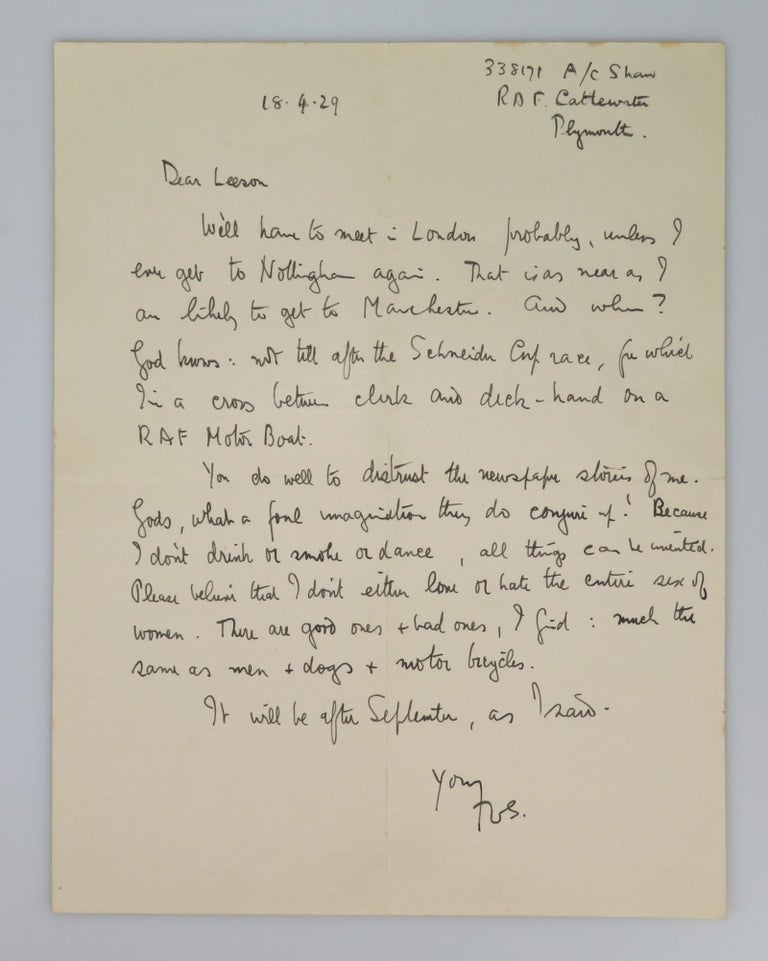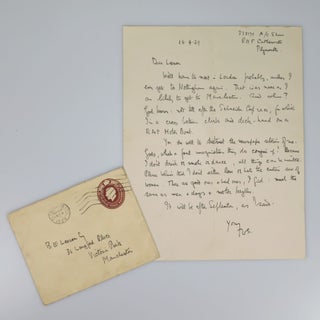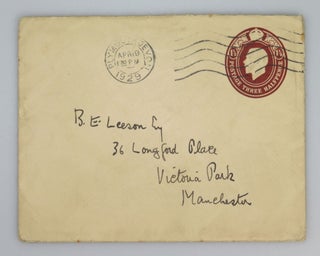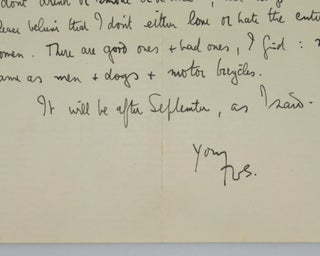"Please believe that I don't either love or hate the entire sex of women." - An 18 April 1929 autograph letter signed by T. E. Lawrence "of Arabia" to an Arab Revolt comrade, former Royal Flying Corps pilot B. E. Leeson, the letter noteworthy for displaying Lawrence's convoluted feelings about both his public persona and the opposite sex
Royal Air Force Station Cattewater, Plymouth: 1929. Letter. This is an 18 April 1929 autograph letter signed by T. E. Lawrence to an Arab Revolt comrade, notable for Lawrence’s bold statements about both his public image and his uncomfortable, equivocal relationship with the opposite sex.
Lawrence’s letter, on a single 9 x 7 inch (22.9 x 17.8 cm) sheet of laid paper, inked in 20 lines, reads: “338171 A/C Shaw | R A F. Cattewater | Plymouth. | 18.4.29 | Dear Leeson | We’ll have to meet in London probably, unless I | ever get to Nottingham again. That is as near as I | am likely to get to Manchester. And when? | God knows: not till after the Schneider Cup race, for which | I’m a cross between clerk and deck hand on a | RAF Motor Boat. | You do well to distrust the newspaper stories of me. | Gods, what a foul imagination they do conjure up! Because | I don’t drink or smoke or dance, all things can be invented. | Please believe that I don’t either love or hate the entire sex of | women. There are good ones & bad ones, I find: much the | same as men & dogs & motor bicycles. | It will be after September, as I said. | Yours | TES.” The accompanying original franked envelope is addressed by Lawrence in four lines “B. E. Leeson Esq | 36 Longford Place | Victoria Park | Manchester”.
Condition is excellent. The letter is clear, clean, and complete, folded by Lawrence once vertically and once horizontally to fit in the original envelope. We note only a touch of spotting along the upper right edge. The envelope is slit and missing a small part of the flap, but otherwise intact, modestly soiled and worn at the edges. The letter and envelope are each housed in a clear, removable, archival sleeve within a rigid, crimson cloth folder.
T. E. Lawrence's (1888-1935) remarkable odyssey as instigator, organizer, hero, and tragic figure of the Arab revolt against the Ottoman Empire during the First World War transformed him from an eccentric junior intelligence officer into "Lawrence of Arabia." He spent the rest of his famously short life struggling to variously reconcile, reject, share, and repress this indelible experience. In 1922, Lawrence’s desire to evade his fame led him to enlist in the Royal Air Force, first under the name “John Hume Ross” and, later, “Thomas Edward Shaw” – a name he used until his death. Hence his “TES.” signature.
The recipient of this letter, Brian Ernest Leeson (1894-1965), was a fellow veteran of the Arab Revolt during the First World War and a former airman. In January 1917, Leeson joined a Royal Flying Corps squadron providing aerial support to Arab and British forces in the Middle East. Leeson and Lawrence apparently first met in April 1917 when they traveled with a small group through the scorching, waterless Wadi Hamdh for days to find and recover a crashed biplane – an experience that apparently helped create an enduring bond.
This letter touches on multiple noteworthy threads, among them Lawrence’s attempted refuge in the supposed anonymity of his long enlistment in the R.A.F., as well as his inclination to speed and mechanical aptitude. However, by far the remarkable aspect of this letter is the paragraph dealing with the press and women.
Much has been made of Lawrence’s aversion to women and sex, and even more made of his masochism. Certainly, Lawrence’s convoluted feelings about both his public persona and the opposite sex are on display in this letter.
The sentences Lawrence penned to his old Arab Revolt comrade, Leeson – castigating the newspapers for how they portrayed him, asserting his acetic habits, and professing a studied indifference to women even to the point of comparing their qualitative variations to those of “dogs and motor bicycles” – is a delicious bit of affected dudgeon and thinly veiled misogyny. Perhaps these sentences neither reveal nor disguise what has already been assumed about Lawrence, but they do vigorously underscore his complexities, contradictions, and the limitations of ever fully penetrating the shadows of his true nature. Item #006784
Price: $8,500.00




